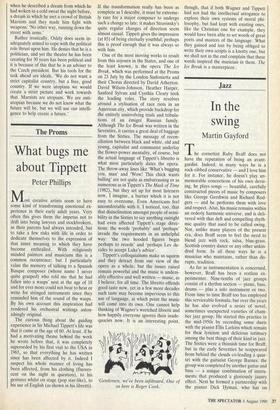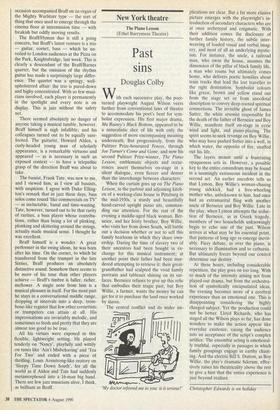Jazz
In the swing
Martin Gayford
The cornettist Ruby Braff does not have the reputation of being an avant- gardist. Indeed, in many ways he is a rock-ribbed conservative — and I love him , for it. For instance, he doesn't play un- memorable concoctions of his own devis- ing, he plays songs — beautiful, carefully constructed pieces of music by composers like George Gershwin and Richard Rod- gers — and he performs them with love and respect. Also, his music remains within an orderly harmonic universe, and is deli- vered with that deft and compelling rhyth- mic quality that used to be called swing. Nor, unlike many players of the present era, does Braff seem to feel the need to blend jazz with rock, salsa, blue-grass, Scottish country dance or any other unkin- dred form. In all these ways he is a musician who maintains, rather than dis- rupts, tradition.
As far as instrumentation is concerned, however, Braff has been a restless ex- perimenter. Nine-tenths of jazz groups consist of a rhythm section — piano, bass, drums — plus a solo instrument or two.
From time to time Braff too has employed this serviceable formula; but over the years he has also evolved a series of novel, sometimes unexpected varieties of cham- ber jazz group. He started this practice in the mid-1950s by recording some duets with the pianist Ellis Larkins which remain for their lyricism and delicious intimacy among the best things of their kind in jazz.
The Sixties were a thinnish time for Braff, but in the early Seventies he reappeared from behind the clouds co-leading a quar- tet with the guitarist George Barnes: the group was completed by another guitar and bass — a unique combination of instru- ments that produced a gloriously jaunty effect. Next he formed a partnership with the pianist Dick yman, who has on occasion accompanied Braff on an organ of the Mighty Wurlitzer type — the sort of thing that once used to emerge through the cinema floor at intermission time — with freakish but oddly moving results.
The Braff/Hyman duo is still a going concern, but Braff's latest venture is a trio — guitar, cornet, bass — which he un- veiled to London audiences at the Pizza on the Park, Knightsbridge, last week. This is clearly a descendant of the Braff/Barnes quartet, but the omission of the rhythm guitar has made a surprisingly large differ- ence. The quartet was a springy, well- upholstered affair: the trio is pared-down and highy concentrated. With so few musi-
cians involved, each player is permanently in the spotlight and every note is on display. This is jazz without the safety net.
There seemed absolutely no danger of anyone taking a musical tumble, however. Braff himself is nigh infallible; and his colleagues turned out to be equally sure- footed. The guitarist, Howard Alden, a curly-headed young man of scholarly appearance, is a remarkable virtuoso and appeared — as is necessary in such an exposed context — to have a telepathic grasp of the direction Braff was about to take.
The bassist, Frank Tate, was new to me, and I viewed him, as I view all bassists, with suspicion. I agree with Duke Elling- ton's remark that in jazz these days, bass solos come round 'like commercials on TV' — as ineluctable, banal and time-wasting. Tate, however, turned out to be that rarity of rarities, a bass player whose contribu- tions, rather than being a lot of plinking, plonking and skittering around the strings, actually made musical sense. I thought he was excellent.
Braff himself is a wonder. A great performer in the swing idiom, he was born after his time. On the cornet, to which he transferred from the trumpet in the late Sixties, Braff produces an absolutely distinctive sound. Somehow there seems to be more of his tone than other players achieve — Braffs timbre is fuller, richer, mellower. A single note from him is a musical pleasure in itself. For the most part he stays in a conversational middle range, dropping at intervals into a deep, trom- bone-like register that few other cornettists or trumpeters can attain at all. His improvisations are invariably melodic, and sometimes so fresh and pretty that they are almost too good to be true.
All his virtues were exposed in this flexible, lightweight setting. He played tenderly on 'Nancy', playfully and wittily on tunes like 'Ain't Misbehaving' and 'Tea For Two' and ended with a piece of thrilling, Louis Armstrong-like oratory on 'Sleepy Time Down South', for all the world as if Alden and Tate had suddenly metamorphosed into a 16-man big band. There are few jazz musicians alive, I think, as brilliant as Braff.

















































 Previous page
Previous page